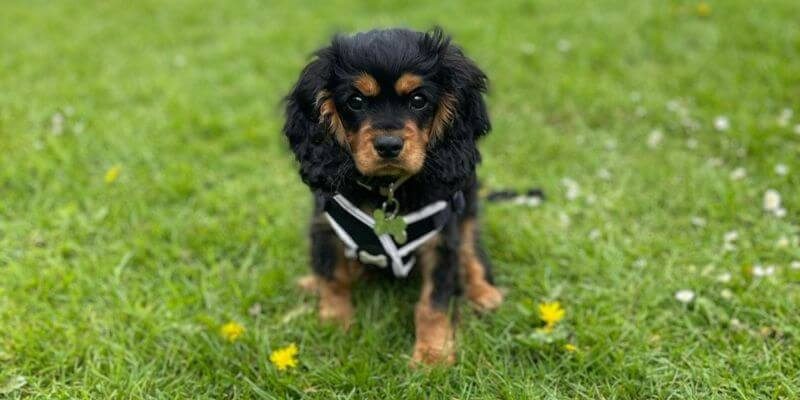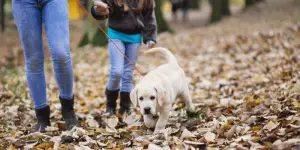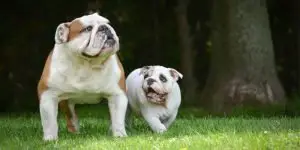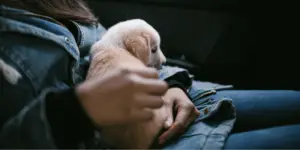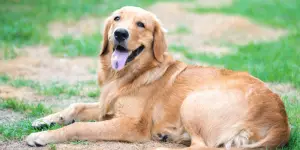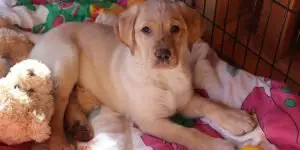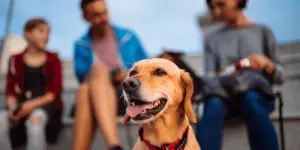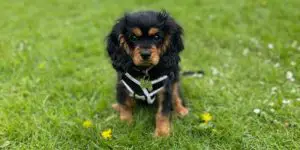
11 Week Puppy Development – What To Expect
At 11 weeks old, your new puppy will be a lot more active and mischievous than they were at 8 weeks of age. You certainly have your work cut out for you!
But don’t worry, our handy 11-week-old puppy guide will help you know what to expect during this stage of your pooch’s development. That way, your puppy won’t be able to pull any tricks on you as you’ll have already prepared for them!
11-week-old puppy schedule
It’s a good idea to set up a daily schedule for your puppy as soon as possible – this will help you plan your day around your pup’s care. Below is a sample 11-week-old puppy schedule you could use, but feel free to make adjustments to suit your lifestyle.
| Time of day (Hour) | Activity |
|---|---|
| 7am | Potty break. |
| 8am | Potty, meal and activity. |
| 10am | Potty break and sleep. |
| 12pm | Meal, potty, break, and activity. |
| 3pm | Nap |
| 4pm | Potty break and activity. |
| 5pm | Meal and activity. |
| 7pm | Nap |
| 8pm | Potty break and activity until bedtime. |
| 10pm | Potty break and bedtime. |
| 2am | Potty break |
11-week-old puppy sleep schedules
All dogs sleep a lot, but especially at 11 weeks old. In fact, a healthy puppy should spend more time napping than adventuring. As canines are polyphasic sleepers, they rest in small bursts during the day instead of one long chunk in the evening.
Puppies usually sleep anywhere from 30 minutes to 2 hours a time, and it’s not uncommon for them to nap every hour or so.
How much sleep does an 11-week-old puppy need?
Sleep is a vital part of an 11-week-old puppy’s development, so they need a lot of it. The majority of dogs at this age snooze for between 18 to 20 hours daily.
As your puppy matures, they won’t need as much sleep, but even adult dogs nap for around 8.5 to 13 hours every day, sometimes more depending on the breed.
11-week-old puppy training
Eleven weeks of age is a great time to begin potty training your puppy as they will have more control of their bladder. Hopefully, you’ve already made a start by getting your pup accustomed to going outside and using training pads during the earlier stages of their development.
Crate training pairs well with potty training as dogs are far less likely to urinate/defecate where they sleep. If you haven’t done so already, slowly introduce your puppy to using a crate to sleep.
We have a dedicated article on how to stop your puppy from crying in their crate if you’re having trouble with crate training.
You can also start teaching your puppy a recall cue as well as some simple commands like “sit”, “stay”, and “lay down”. Positive reinforcement is key in all aspects of dog training – your puppy is more likely to repeat an action if they are rewarded for it.
You should never punish your puppy if they make a mistake during training or have an accident. Instead, ignore the behavior, and simply focus on praising your puppy when they do something right!
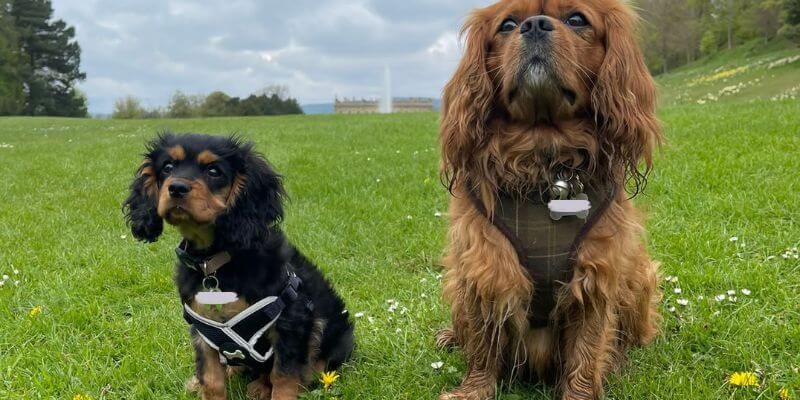
11-week-old puppy behavior
An 11-week-old puppy is a lot like a human infant – they’re adventurous, energetic, mischievous, and have a habit of putting everything they can find in their mouths.
Curious
At 11 weeks old, puppies are eager to explore their surroundings and get into mischief. Wild female wolves actively encourage their pups to leave their dens and adventure at this age.
You should make sure your home has been fully puppy-proof as trouble will always seem to find your pooch.
Energetic
Although your puppy will still be very clumsy at 11 weeks old, they will have more coordination than they did a few weeks ago. Your pooch will love to play and run around the house, often in tight circles known as the “zoomies”.
Fortunately, your puppy will still spend a large portion of the day asleep, so you’ll have plenty of time to prepare for your pup’s next hyperactivity session!
Teething
Most puppies start getting their adult teeth at around this age, so you may notice them chewing on everything to help find relief. You should avoid letting your puppy bite hands, clothes, furniture, etc, and redirect their focus to more appropriate things to chew like dog toys.
Separation anxiety
It’s not uncommon for 11-week-old puppies to throw a tantrum if they are left alone, especially during the early stages of crate training.
You should refrain from giving your puppy attention when they are being noisy as this will teach them that crying/barking will result in your return. Instead, wait until your pooch is calm and quiet before you come back.
Naughty Puppy Behaviour
A couple of common problems associated with 6-month-old puppies is disobedience and not coming back when called. The former usually results in a lot of young dogs being put in rescue centres, unfortunately.
It can be frustrating dealing with a puppy who won’t listen, but you need to keep up your training sessions (we keep reiterating this, but it really is important!).
Offer treats, games, or praise when your puppy is responsive and listens to your commands. Reward them after good behaviour so they associate it with a positive.
If your pooch isn’t returning to you when you call them back on walks, it could be because you’re not as appealing as the thing they’re sniffing, exploring, etc. You need to give your dog a reason to want to come back to you, whether it’s because you have a tasty treat or their favourite toy.
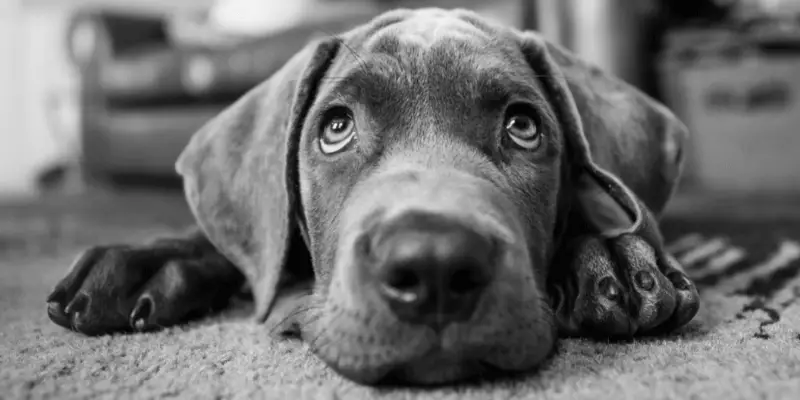
11-week-old puppy feeding
From between 8 to 12 weeks old, puppies need 3 to 4 meals a day. You should make sure your puppy is fed high-quality wet or dry food targeted for their life stage as adult food doesn’t contain the right balance of nutrients.
How much food does an 11-week-old puppy need to eat?
The amount of food your 11-week-old puppy needs to eat a day depends on their size and energy levels, with larger and more athletic breeds needing more food than smaller, less active ones.
As a general rule of thumb, you should feed your puppy 20g of food per kg of body weight. So, for example, if your pooch weighs 5kg, you should give them 100g of food.
Most commercial dog food brands list their recommended portion sizes on the back of the packaging to help you know how much to feed your pup.
Make sure you don’t feed your puppy’s daily food allowance all at once. Instead, split up the portion into smaller meals around 3 to 4 times a day.
Bear in mind that you’ll need to lower the amount of food you feed your puppy if you regularly offer treats, otherwise, it can lead to weight gain.
6-Month-Old Puppy Socialisation
While the prime time to socialise your puppy is when they are 8 to 16 weeks old, that doesn’t mean you should stop socialisation altogether. It’s still crucial for your canine to explore their environment and be introduced to new things.
Keep meeting new people and going to new places, and allow your puppy to experience things they’re not used to. This will increase their confidence and shape the type of dog they become as they mature into an adult.
Remember, ignore undesirable behaviour and reward good behaviour. Dogs learn best through positive reinforcement.
For example, if your dog barks or acts frightened when they see a bicycle, don’t yell or punish them. Keep walking and continue subjecting them to the fear until they start to relax.
The first time your dog walks past a bicycle calmly, give them a lot of praise and a reward (seriously, make a song and dance of it!). Your pup is more likely to repeat an action if they know something good comes after it.
Read our guide on what to do if your 6-month puppy is breathing fast in its sleep – what to look out for.
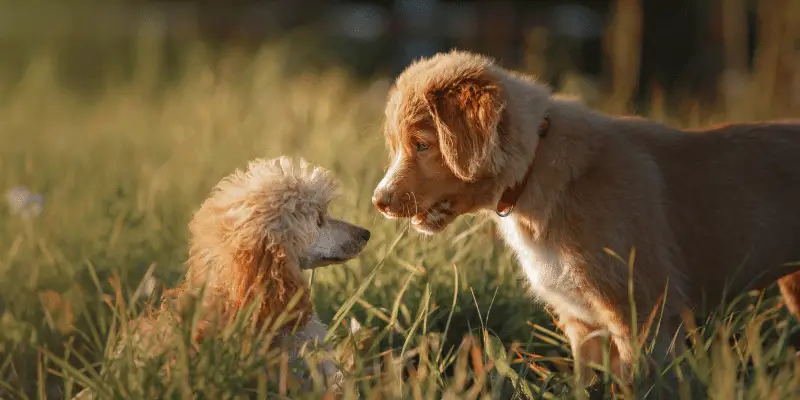
How much water does an 11-week-old puppy need?
According to the American Kennel Club, puppies that have been weaned need between 0.5 to 1 ounces of water per pound of body weight per day. It’s important to monitor your puppy’s daily water intake to ensure they are drinking plenty of fluids.
You should increase your puppy’s water intake on hot days or during intense activity to prevent dehydration.
While it can be tempting to restrict the amount of water your pooch drinks during potty training, this should be avoided. Your puppy should always have access to fresh, clean water, especially as young dogs are more prone to dehydration than adult dogs.
What does an 11-week-old puppy look like?
At 11 weeks old, puppies will look like miniature versions of their adult counterparts, though usually a bit ganglier and fluffier!
Your pup’s deciduous (baby) teeth should have fully emerged this age, and their adult set should begin erupting fairly soon.
Certain breeds look a bit different as puppies than they do as adults, like the Great Dane. As pups, they are much bulkier with shorter legs. This breed continues to grow and build muscle until 2 years of age, at which point they will be very large and tall dogs!
11-week-old puppy health and care
There’s a lot more to an 11-week-old puppy’s care than just feeding and playing. You’ll also need to exercise your puppy and keep on top of vaccinations, vet check-ups, exercise, and grooming duties.
Your puppy will need two rounds of vaccinations to protect them from infectious illnesses like canine distemper and parvovirus. The first is usually given at 8 weeks old, and the second is typically administered at 10 weeks of age. However, dogs can be vaccinated as young as 4 weeks of age.
Your pooch will need a booster vaccine at either 6 or 12 months of age, then once every year for the rest of their life. It’s also good practice to take your puppy for an annual health checkup to make sure they’re in good shape.
Exercise is another key part of your puppy’s care as it provides them with both physical and mental stimulation. A 15-minute walk around the block or your backyard should be plenty for an 11-week-old pup.
Lastly, you should be regularly brushing your puppy’s fur, as well as cleaning their teeth and ears, and trimming their nails.
Can I walk my 11-week-old puppy outside?
You can walk your puppy outside in public areas as long as they’ve had their second vaccine (and two weeks have passed since). If your puppy hasn’t had their vaccinations yet, make sure you book an appointment with your vet as soon as possible.
Unvaccinated puppies can go outside in an enclosed backyard provided it can’t be accessed by dogs, not in their household.
Final thoughts
Week 11 of your puppy’s development can be hard work due to the amount of training and socialization sessions you need to undergo with your puppy. It doesn’t help that a lot of puppies at this age can have a bit of a rebellious streak!
Hopefully, this article helped you learn everything you need to know to care for an 11-week-old puppy like a pro. As your puppy matures, things will get a lot easier, so try not to be too hard on yourself – you’re doing great!
Besides, we have you covered for the entirety of your puppy’s development to help you keep in the know, with separate guides on all the important life stages of a young dog, including 12 weeks and 6 months of age.
References
- https://wagwalking.com/lifestyle/dog-ownership/puppyhood-what-to-expect-at-11-to-12-weeks#:~:text=11%20Week%20Old%20Puppy&text=Your%20little%20fur%20ball%20is,never%20be%20used%20on%20humans.
- https://www.thesprucepets.com/puppy-development-from-8-to-12-weeks-4586406
- https://www.akc.org/expert-advice/health/puppy-drinking-enough-water/#:~:text=Generally%2C%20young%20puppies%20need%20about,of%20body%20weight%20per%20day
- https://pethelpful.com/dogs/Puyypy-Stages-12-Week-Puppy-Behaviorhttps://www.rspca.org.uk/adviceandwelfare/pets/dogs/health/vaccinations

Written by: Joshua Gordon
Head of Research and Editorial, Joshua has over 7 years of experience as a finance and automotive research consultant. He is a childhood pet owner and dog enthusiast.

